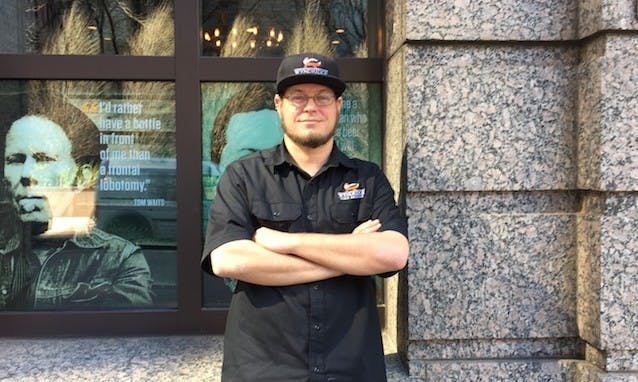Fresh Picked: Wyndridge's Apples N Oranges

04.04.17
STEVEN BURNS
Over the years City Tap has been lucky enough to collaborate with breweries like Yards and Victory to create limited edition variations of house favorites and one-of-a-kind beers. For the first time, we’re reaching out and picking something farm fresh and ultra juicy: a craft cider. Wyndridge Farms, located in Dallastown, Pennsylvania or the “Napa Valley of apples” (as Wyndridge likes to call it) has crafted quite a few notable ciders including their Crafty Cider, Hopped Cider, Cranberry Cider and more. Their dedication to cider stems from the genius of Scott Topel who’s been making cider for the past 17 years. His most recent creation is called Apples N Oranges. We sat down with Jason Stewart, Wyndridge’s very first (and therefore super OG) sales rep to talk about this special release just in time for spring. Craft cider isn’t quite comparing apples to apples. It’s about the magic and flavor of the land.
CTH: First, what’s Apples N Oranges all about?
Jason: “One, it's a play on words; two it's exactly what's in the product: apples and oranges. The description is right there in the name. We worked with Scott Topel, who's our cider maker. He's been making cider and only cider for at least 17 years, which is a pretty rare find in the industry. A lot of times you see guys coming over from the wine industry or the brewing industry trying to figure out how to make cider or applying their knowledge to cider. He's dedicated his life to solely making cider. He's the cider whisperer.
We're only using Pennsylvania fruit in there. All the apples are grown in Adams and York County. For Apples N Oranges, it's going to be coming in at 6%. That was all northern spy apples. We fermented that with 72lbs of mandarin oranges, bitter orange peel, and orange blossom honey from a farm in Lancaster. It's something light, refreshing; the citrus will be there but the apples will shine through. We're more concerned about pulling the essential oils out of the citrus. We didn't want it to be super murky.
Apples and oranges got little extra time. We're going to ferment the cider first. Then we did a refermentation with the orange blossom honey. Usually, our ciders take four to five weeks. Our ciders are usually fermented a little bit colder and a little bit longer than some of the other producers out there. It gets an extremely vigorous fermentation at a higher temperature, say 68 degrees in the ale range, they tend to produce more amounts of hydrogen sulfide which will give you sulfury, egg kind of aroma on it. We choose to go a little lower; in the 58, 60-degree range. We'll stretch that out to two weeks so you get a nice gentle fermentation. You get a nice, cleaner product.”

CTH: What distinguishes Wyndridge Farms from other cider makers?
Jason: "There's a lot of pseudo-ciders on the market that are made using apple concentrate from indeterminate origins. They end up being very sweet and syrupy. They end up coming off like an apple soda instead of eating an apple. They have this flat, sort of one-dimensional flavor as well. We try to take a winemaking approach to everything we're doing. Everything that's good in life starts with high-quality ingredients. Your goal is to do as little to them as possible."
CTH: What’s the deal with ciders to begin with? What makes craft cider unique and challenging?
Jason: "[With ciders] people sometimes lump them all in together. I get from a lot of people, ‘Well, I don't like cider.’ Then I ask, ‘What have you had?’ They've usually had the three biggest producers in the country. There's other stuff out there. For a while, that's all there was. In the past couple of years we've really seen craft cider come into its own. It's kind of where the craft beer industry was ten years ago. We're getting a lot of craft beer drinkers to take a second look at the category right now. There's more out there than the big artificial sweet stuff. They're starting to respect what we're doing.
The word "terroir," which you hear a lot in the wine world, is sort of a taste of place. These grapes grown in this soil on this hill will taste different than the other side of the hill or the next town over. It's a tough thing to express with craft beer. At the end of the day, it's more about what the brewer is doing. They can all start with more or less the same ingredients; the hops from the northeast, the grains from the midwest. It's on them to figure out how to coax the flavors out of it. With ciders you get a lot more expression of the flavors where it's from, which you don't really get in the beer world. When selling cider we have one foot in the wine world, and one foot in the beer world."
Sounds like a good place to be.
Take a bite of Apples N Oranges at City Tap University City, Logan Square, and Penn Quarter. Miss our interview on the origins of Wyndridge Farms? Read on here.
